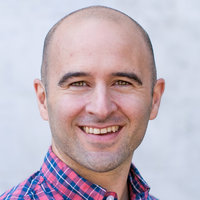Christians have never been strangers to pain. From Job’s cry of “How long, O Lord?” to Jesus’s own suffering on the cross, the people of God have always wrestled with the reality of evil and the mystery of divine love. The Theology Lab at Highrock Covenant Church has spent the past year exploring these questions through a free online series titled “Deliver Us from Evil.” While these conversations include theologians and ministry leaders, they are ultimately for the church—helping everyday Christians process suffering, wrestle honestly with God, and live as thoughtful disciples in their own communities.
Theology Lab participants come from many walks of life: Tom Baskett, a vocalist and professor at Berklee College of Music; Lauren Cairco Dukes, a software engineer with a PhD in computer science; Grace Chiang Nicolette, a nonprofit executive; and David Saff, a software engineer at Google. Together they reflect the wide range of vocations and perspectives that make up the church—and the shared longing to understand faith amid suffering.
Why should the church engage the topics of faith, evil, and human suffering?
Grace N. In 2023, my dad suffered a massive stroke, and in a flash, everything changed. In the aftermath, I witnessed God’s mercy in profound ways: in the timing of medical help, the excellent care he received, the kindness of our community, the immense privilege of paid family leave, and the daily strength that carried us through his hospitalization and rehab. There were too many providences to recount, and we experienced clear answers to desperate prayers.

As a family that follows Jesus, we could not deny that God was with us in our heartache, grief, and exhaustion. Yet each in our own ways we have wrestled with the harder question: how could God allow the stroke in the first place? Why did this happen to our healthy loved one?
The church must not shy away from the tensions that suffering raises in our faith. Reflection on evil, suffering, and trusting God isn’t just a theological practice—it’s intensely personal. Suffering will touch every one of us. What kind of community will we be when it does?
David S. When I joined prison ministry, I realized how inadequate my instincts about civil justice were—and how they shaped my instincts about divine justice.
On television, redemption follows a simple script: a tragedy, an investigation, an arrest, and finally a sense of restored order. But worshiping with real men who had been led away in handcuffs showed me how thin that script is. In a fallen world, each of us faces the flood of pain passed down from yesterday. Some fall into patterns that lead to prison; all of us face the same flood. By learning to be the people of the crucified Jesus together, we proclaim hope that there is a better answer than passing pain on to tomorrow.
Why is it important to engage theologically?
Tom B. Faith is the church’s ultimate answer to evil and human suffering. Through faith in Christ, we believe that all suffering will be healed and every evil overcome—by the power of God working both miraculously and through the Spirit-empowered efforts of faithful people. Defiantly hopeful, the church proclaims that through faith in the love of God, all will be made right in the end—and if it’s not all right, then it’s not the end. Yet this teaching requires more than belief: it calls for empathy, reflection, and honest self-examination as we seek to overcome evil with good.

Lauren D. “How could a loving God allow evil and suffering?” Every person grapples with this question, seeking meaning in their own pain or trying to make sense of a broken world. We’ll never have a fully satisfying answer, but when we work through these questions together, we stay more hopeful, compassionate, and faithful, seeing God’s goodness in one another.
Grace N. If we don’t engage theologically on the question of suffering and evil, we do a great disservice to those seeking solace from God when awful things happen. People will go elsewhere to find truth if the church stays silent on this topic.
What questions about faith and suffering remain?
Tom B. Even considering the spiritual ancestors who are praised in Hebrews 11, it’s difficult to accept that most people will live and die without seeing evil overcome or suffering healed. Only the Lord’s return is our hope. Cynicism is ever-present, especially when I consider my own privilege compared to those who suffer. Why have I been spared? I’m not sure I’ve ever come to terms with being so blessed while others endure so much.
Grace N. I wish we discipled people earlier in their faith journey around these hard topics. As I was growing up in the church, it often seemed that the faithful response to suffering was to push down emotions and questions—to smile and “trust God.” I now see how unhealthy that is. It’s far better to talk openly about hard questions, to sit with those who are suffering and listen to their fears, than to run away or expect people to deal with it alone.
What questions from Scripture do you wrestle with?
Lauren D. I’ve thought a lot about Hagar and Ishmael. Pregnant Hagar flees an abusive mistress; when God meets her in the desert, Hagar declares that God is “the One who sees me.” Yet God sends her back to her mistress. Later, when she and Ishmael are cast out, God again sees and rescues them. What does it mean that sometimes God sees suffering and allows it to go on, and sometimes God ends it?

The story resonates because giving birth to my firstborn in May 2020 was intensely traumatic. God seemed to have ordained the timing of the pregnancy, yet our baby came into a world locked down by a deadly virus. It seemed cruel for God to see us exhausted, afraid, and alone, and not bring relief. Though the trauma has healed, I still wonder, “Was God really good to me in this?”
David S. I’ve wrestled for years with stories, mostly in the Old Testament, where humans suffer and God appears to be the cause. How do I understand the God whose Spirit enabled Christ to suffer for us as the same God who orders the extermination of Amalekite children in a battle 400 years earlier?
As we reflect on evil and suffering together, what do you hope for?
Tom B. That we receive greater clarity and encouragement from the Spirit as to how to live out our faith. Our calling is to work energetically—personally and corporately—to see evil overcome and suffering ended. I hope we have the bravery to do our part and the grace to rest when our efforts fall short. Cynicism often feels reasonable, but may the Spirit give us the peace that surpasses understanding.
Grace N. That we don’t settle for easy answers or positive thinking. Instead, I hope we learn to walk with one another through life’s hardships and develop a robust theology and practice around suffering, good, and evil. In this honest wrestling, we can better embody the love and hope of Christ for a hurting world.

David S. That we can, with thoughtfulness, courage, and dependence on Christ, knit ourselves into a strong fabric that can hold those who suffer today and those who will suffer tomorrow. Early in It’s a Wonderful Life, young Harry Bailey falls through the ice into freezing water. His brother calls out, “Make a chain!” Their friends link arms and pull him to safety.
How do we make a chain—holding onto Jesus and each other—to keep others from being swept away?
Lauren D. That we learn to embody gentleness, humility, and grace toward those who are suffering, choosing solidarity over comfort. Jesus is our example: he entered our humanity, wrestled with God in Gethsemane, endured betrayal, torture, and death. He didn’t shy away from our struggle but embedded himself in it, so we know we are never alone. Let us seek to be more like him.
Across these reflections runs a shared conviction that faith does not exempt us from suffering—it teaches us how to endure it together. The church’s calling is not to explain away pain but to bear it faithfully, making a chain of compassion and hope until all is made right.
Learn more about Theology Lab’s free online series “Deliver Us From Evil,” or register for upcoming conversations here.














